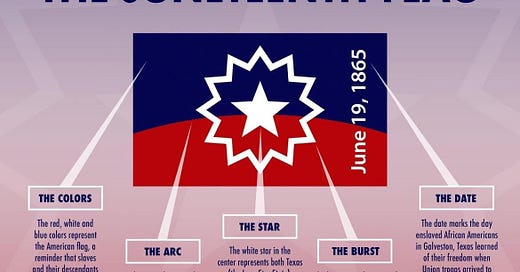Juneteenth Is Not Summer Kwanzaa
“Juneteenth was never about African unity. It was about delayed justice in America.”
For years, critics of the American Descendants of Slavery (ADOS) movement have hurled wild accusations our way. They’ve called us politically illiterate. Russian bots. Disinformation agents. But the loudest and most persistent smear? That we’re xenophobic.
This accusation is false. We hold no prejudice toward people from other countries. But there is a tension between ADOS and certain segments of the Black immigrant population—and the source of that tension ain’t us.
ADOS have always been an inclusive people. We’ve lived alongside and supported other communities for generations without issue. We stood against apartheid in South Africa. And here in the U.S., when a Black immigrant—like Botham Jean or Amadou Diallo—is gunned down or mistreated, we show up in solidarity, no questions asked.
But that solidarity has rarely been reciprocated. The tension surfaces when Black immigrants—and Pan-Africanists more broadly—co-opt our history, piggyback on our justice claim, and attempt to rewrite it as a Diaspora-wide narrative. No better example of this exists than the cultural hijacking of Juneteenth—a day set aside to mark the end of chattel slavery in the United States—which has been rebranded into what I can only call “Summer Kwanzaa.”
Although Juneteenth has long been celebrated by ADOS families—especially in Texas—it only became a federal holiday on June 17, 2021, when President Joe Biden signed the Juneteenth National Independence Day Act into law. The original Juneteenth flag is red, white, and blue—just like the American flag—because it commemorates our ancestors’ march toward freedom in America.
But now, you’ll see Juneteenth flags redesigned with the red, black, and green of Pan-Africanism. The smell of candied yams and black-eyed peas is being crowded out by jerk chicken and plantains. The historical link to Texas, to American slavery, to our ancestors’ fight for full citizenship, is being erased—buried under a wave of Afrobeat playlists, ankara prints, and vague calls for "Black unity." This isn’t solidarity. It’s cultural appropriation. It’s erasure.
And it’s particularly offensive when you consider that Pan-Africanists already have Kwanzaa. They already have Caribbean Heritage Month—all of June, in fact—except one day. June 19th. Juneteenth. Our day. But instead of respecting that boundary, we’re expected to share it in the name of “unity.”
A Twitter user recently asked me, “Why can’t Juneteenth be a celebration of African unity? Because I view ADOS as an extension of African history?” But let me flip that question around and ask a few of my own:
Why must everything that belongs to ADOS become the property of the Diaspora? Why must everything that is mine become ours—and why is that demand always placed only on us? Would you crash a Haitian Flag Day parade and demand inclusion because… unity?
Why is it that when ADOS draws strong boundaries around our identity, our lineage, and our sacred holidays, we’re labeled xenophobic—but the groups doing the boundary-setting toward us never are?
Why do Africans need us to validate their identity, even though we’re 400 years removed from the continent and have no connection or memory of its 54 nations? You don’t see people of European descent being told to identify as European before American. No one insists on that erasure of national belonging.
And maybe, just maybe, the "forgetting tree" those African slave traders forced our ancestors to walk around before selling them to Europeans… maybe it worked. Maybe we forgot. And maybe that forgetting wasn’t a tragedy—it was a natural part of becoming something new and different and beautiful here in America.
So I ask again: why do non-ADOS members of the Diaspora feel entitled to dictate what Juneteenth means, what it should look like, or who it should include? Isn’t that just symbolic colonization dressed up in cheap kente cloth?
Because from where I stand, this isn’t Pan-African unity.
This is lineage theft.
This is cultural dispossession.
It’s the same kind of erasure that transformed the Statue of Liberty—originally meant to celebrate freed slaves—into a beacon for European immigrants.
And let’s not forget the real history. Juneteenth marks the day—June 19, 1865—when Union General Gordon Granger arrived in Galveston, Texas and announced that the Civil War had ended and enslaved people were free. It came two and a half years after the Emancipation Proclamation, because Texas had refused to comply. Juneteenth is not just about freedom—it’s about delayed freedom, denied justice, and a people who had to wait even after legal emancipation.
It is a holiday forged in our struggle, soaked in the blood of our ancestors, and rooted in our fight for recognition—not as global citizens, but as Americans.
So no, Juneteenth isn’t for everybody. It’s for ADOS. And we’re reclaiming it.





Madame President, I've said it before but it's worth restating; I am so proud and glad that you're soldiering on the side of righteousness and justice for ADOS. The ancestors are pleased.
Madam President, your narrative was clear, concise & to the heart of the matter. I’m exhausted by the 🖤diaspora force teaming Juneteenth behavior. I found out 14 yrs ago how African countries sold us for chicken change. At 1st l didn’t want to believe it because my l really liked my 🇳🇬 acquaintances. My former spouse Never mentioned his family’s involvement in the transatlantic chattel slave trade.